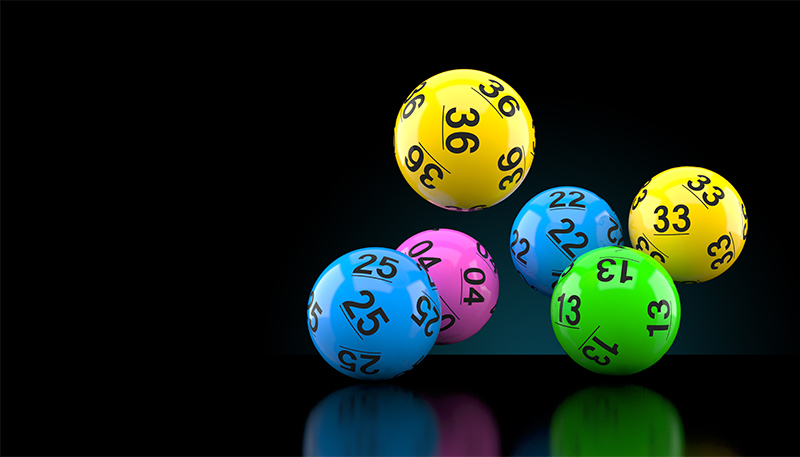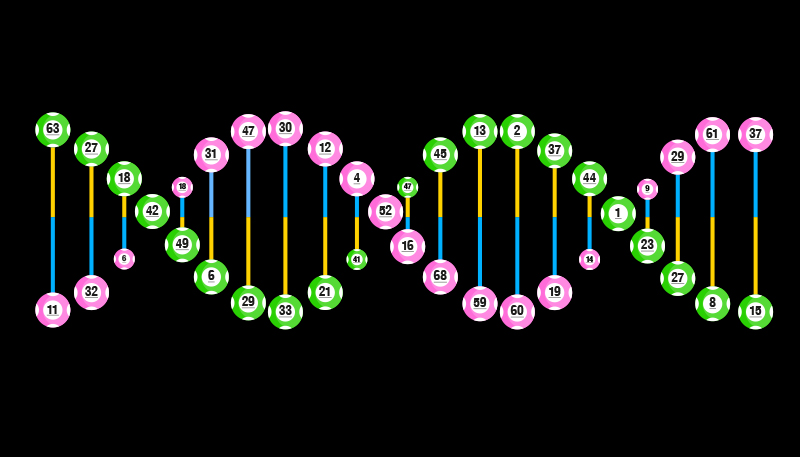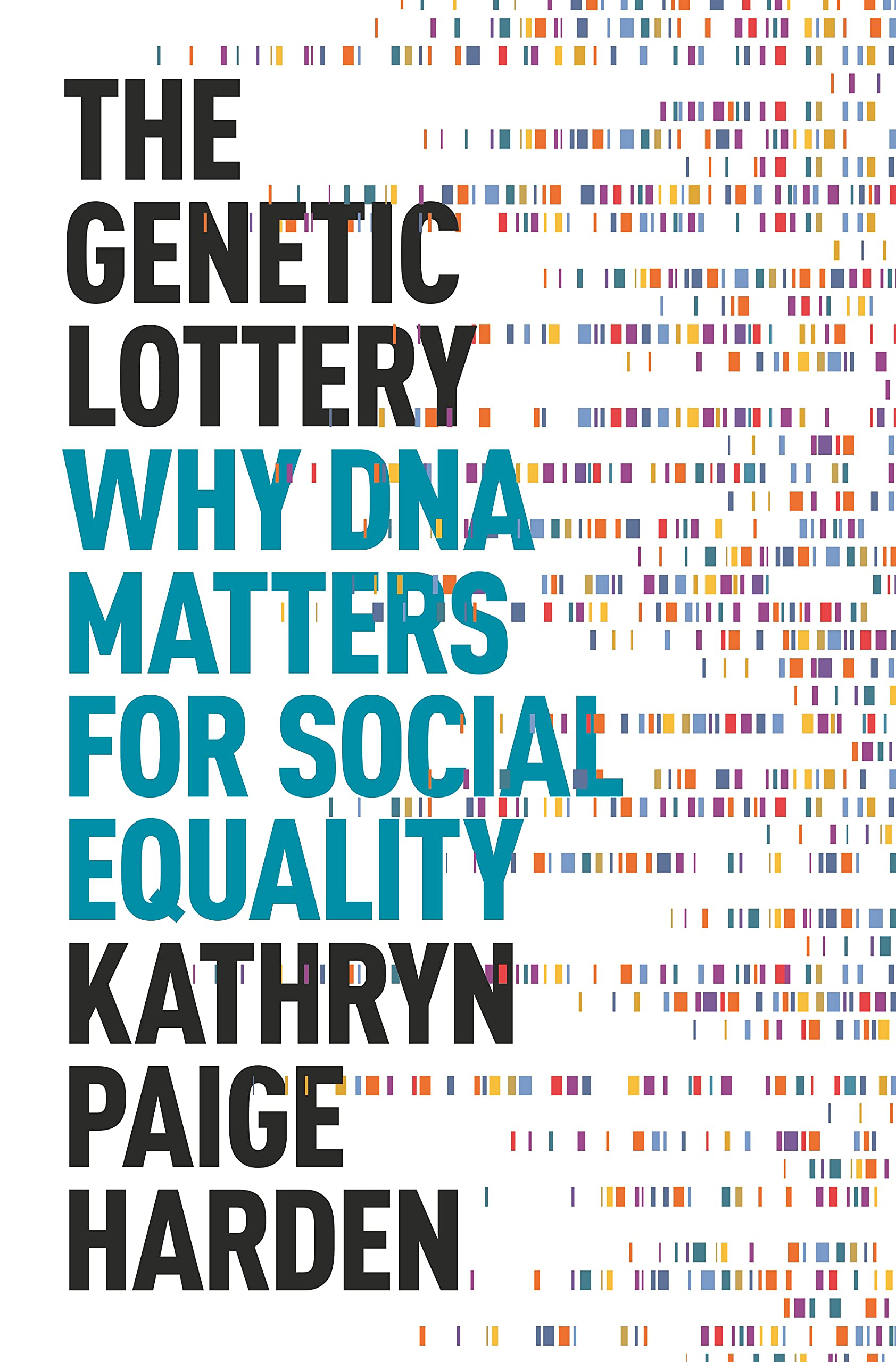Luck of the (Genetic) Draw
How do our genetics, life experiences and choices converge to allow the successes or create the failures that make us who we are? If we’re all 99.9 percent the same genetically, does DNA have any impact on our chances of success in life?
The Genetic Lottery: Why DNA Matters for Social Equality
Kathryn Paige Harden. 2021. Princeton University Press, Princeton and Oxford. 312 pages.
At the top of a hill sits a ball. When released, where will it roll? Off to the right, or into a valley to the left? Over the hump and down the middle? What commits it to one path or another? Perhaps the slope is a bit steeper on one side. Maybe hidden influences from below push and pull the contours of a surface that is more fluid than solid. And what if the ball isn’t perfectly round?
Is the final outcome just chance, unpredictable, a different result for every roll?
The ball on a hill is a figurative way of describing one’s life course. Think of the course of your own life: How have you rolled? What path have you followed? Maybe it was a smooth ride, carefree. But likely not. Consider your education: The fact that you’re able to read this right now indicates that you’ve had many successes on your roll down the hill; the seemingly simple ability to read (literacy as well as numeracy) imparts a certain slant to one’s life, a bias where one success leads to another. How much did random events chart your course, and how much were various outcomes in your life completely beyond your control? Can we say we deserve to be where we are?
Success or failure in negotiating the hills and valleys—the gateways, so to speak—of education alone can change everything. How easy, or tragic, it might have been to travel a different course. Where might you have ended up? Who would you be? If our identities are built up around a certain set of attainments, would you still be “you” if circumstances had played out differently?
“To the extent that we enjoy good things in life—educational success, good incomes, stable jobs, good physical health, happiness and subjective well-being—it is, in large part, because we have been massively lucky.”
Self-Made
Maybe some of us have the “bootstrap” gene and some do not. Achievers often attribute their success to that ability to overcome challenges through hard work and determination: “I pulled myself up by the bootstraps. If others worked like I did, they would have success too.” But is self-will all there is to it? While it’s highly unlikely that we will ever find individual genes that turn something as complex as self-will on or off, we are learning more about the genetic influences that impact each of us in unique ways.
The debate over how much nature, nurture and simple chance influence success is longstanding. Might genes—our nature—be so powerful that our life course is determined practically from conception? Some have the essential “it,” and some do not? Or, on the other hand, are we so genetically similar that it must be nurture—what we experience, our social situation—that creates different outcomes? Since our parents provide both our social and genetic inheritance, teasing out a conclusion is daunting.
Ideas of a level playing field, equal access or privilege may come to mind. If one could ask 19th-century scientist Francis Galton, known as the father of eugenics (the theory that purported to explain the hierarchy of racial success), he would answer that life outcomes are predetermined by heredity.
Galton insisted, to use our ball-and-hill analogy, that some of us—putting it bluntly, the nonwhite among us—were simply doomed from the beginning to roll off course. Best to help the haves rather than the have-nots, he said. “The stream of charity is not unlimited, and it is requisite for the speedier evolution of a more perfect humanity that it should be so distributed as to favour the best-adapted races.”
Because there simply was not enough support available for all (nor should there be, in his opinion), the less successful nonwhite races would fade away in time due to intrinsic inferiority. This was just the nature of evolution, as described by his cousin Charles Darwin in On the Origin of Species (1859). “I have not spoken of the repression of the rest,” Galton continued, “believing that it would ensue indirectly as a matter of course; but I may add that few would deserve better of their country than those who determine to live celibate lives, through a reasonable conviction that their issue would probably be less fitted than the generality to play their part as citizens” (Inquiries Into Human Faculty and Its Development).
That’s a frightening proposition and, most would agree, no longer to be taken seriously. Yet for anyone who looks at the human condition and hopes for a better future for both individuals and society overall, inequality and the needs of the less successful among us remain urgent problems.
Can genetics help us understand how to help those who aren’t achieving their full potential?
As geneticist Theodosius Dobzhansky remarked decades ago, every talent is crucial as society presses forward: “Even those who are convinced that their substance is finer than the common clay can no longer demand that the growth of others be stunted so that they themselves may blossom. To say that equality of opportunity is a necessary condition for human self-realization and self-fulfillment is not to solve problems, it is merely to state them.”
The 0.1 Percent Difference
As implied by US president Bill Clinton in announcing the results of the Human Genome Project in 2000 (called the “first draft” of the sequence of all 3 billion base pairs of our genome), at that time genes didn’t seem to account for our differences.
“Increasing knowledge of the human genome must never change the basic belief on which our ethics, our government, our society are founded,” Clinton said. “All of us are created equal. . . . I believe one of the great truths to emerge from this triumphant expedition inside the human genome is that in genetic terms, all human beings, regardless of race, are more than 99.9 percent the same.”
According to behavioral geneticist Kathryn Paige Harden, however, equality by genome was a wrong conclusion: “Tying genetic sameness to egalitarian ideals was, I believe, one of Clinton’s mistakes.” The egalitarian ideal says that all of us are equal and must be afforded opportunity without prejudice; but if we seek the best outcomes for all people, then the influence of those small differences is important.
“Race is not a valid biological category. But to hold that there are no genetic differences between groups of people who identify as different races is simply incorrect.”
In The Genetic Lottery: Why DNA Matters for Social Equality, Harden explains that discounting that 0.1 percent can actually hobble progress toward egalitarian goals. It may seem a small number, yet it translates to at least 3 million base differences between any two of us. “Genetic differences between us matter for our lives,” she writes. “They cause differences in things we care about.”
Some of those things are diseases. In the wrong place, even a one-letter change can have disastrous effects: Sickle cell anemia is caused by a one-letter change in the hemoglobin gene on chromosome 11. A mutation on chromosome 12 can cause PKU, a problem with amino acid digestion leading to the slow degradation of a child’s brain. Tay-Sachs, another destroyer of brain tissue, stems from a change found in chromosome 15. Repeating letters on chromosome 4 cause Huntington’s, a fatal neurological disorder.
These are horrible diseases with devastating and oversize outcomes. They represent Game Over holes in the path of life. No one would say that a person deserves to inherit them, or that the parents should have known better. They result from hidden factors that influence the roll of the ball of one’s life.

But Harden wants us to understand how research into these small genetic differences is revealing more subtle links between blind inheritance and what we achieve. “Like a specific 6-ball combination in [the American lottery game] Powerball,” she explains, “the fact that you have your specific DNA sequence, out of all the possible DNA sequences that could have resulted from the union of your father and your mother, is pure luck.”
It is these sorts of hidden truths, and their consequences, that The Genetic Lottery reveals so well. The critical nature of these heretofore mostly unknowns (at least unknown to those of us who aren’t behavioral geneticists) should give us pause—pause to consider both our own history and how we look on others. For this alone, Harden has done a great service.
She notes further, “It is a grave mistake to stake claims for equity, or inclusion, or justice . . . on the absence of genetic differences,” because we are genetically different. But these are not differences in quality; they don’t make us superior or inferior people. “What I am aiming to do in this book,” Harden explains, “is re-envision the relationship between genetic science and equality. . . . Can we imagine a new synthesis? And can this new synthesis broaden our understanding of what equality looks like and how to achieve it?”
Talent Show
Harden is a professor of psychology at the University of Texas–Austin. She doesn’t research genetic disease per se, but the possible genetic links to educational outcomes. “My scientific research uses twin studies and big genetic datasets to understand why people’s lives turn out differently,” she notes in her profile. “Genetic data don’t just tell us about our biology; they are also a tool for understanding how our environments affect us.”
And this is the big takeaway from The Genetic Lottery: genetically influenced tendencies can be liabilities or gifts; the outcomes are determined by what is valued and what is not. Just as organisms thrive or shrivel depending on the conditions of an ecosystem, it’s the social ecosystem we’ve created that allows some to pass and pushes others to fail. Thus, for instance, in an educational arena that currently rewards quieter personalities that can also do math, children who have difficulty simply sitting still and find algebra unintelligible are at a huge deficit; they won’t go far.
Still the most popular TED Talk ever, Ken Robinson’s “Do Schools Kill Creativity?” is spot on in highlighting this reality.
“Many highly talented, brilliant, creative people think they’re not, because the thing they were good at at school wasn’t valued, or was actually stigmatized.”
Combining this with Harden’s work and with Fredrik deBoer’s The Cult of Smart (2020) is an eye-opener. Although we may give lip service to the idea that every child matters, and that every talent is important, our actual on-the-ground practice leans in the opposite direction. We are glacially slow to reinvent the system for the benefit of all our genetically diverse children.
“Some people,” Harden notes, “happen to inherit combinations of genetic variants that, in combination with environments provided by parents and teachers and social institutions, cause them to be more likely to develop a suite of skills and behaviors that are currently valued in the formal education systems of Western capitalist societies.”
These “are not better people,” Harden continues. “They are not more inherently meritorious. They are, given the ways our society is currently constructed, the least vulnerable. And, if you are reading this book, you are probably one of them.”
And yet, she points out, “take the power of the genetic lottery seriously and you might be faced with the realization that many of the things you pride yourself on, your high vocabulary and your quick processing speed, your orderliness and your ‘grit,’ the fact that you always did well in school, are the consequence of a series of lucky breaks for which you can take no credit.”
A Better Path Together
“As a mother,” Harden said in an interview for WBUR, Boston’s NPR news station, “if I’m looking at what makes a good school, I’m not looking for a school that’s going to treat all of my kids the same. I’m looking for a school that’s going to equalize their ability to profit from that school, to learn, to accommodate their uniqueness.”
That’s a good lesson, but how many have that opportunity? In sum, Harden hopes those who structure society will begin to take all of our differences into account. We’re coming to understand that we all roll down the hill of life together. We don’t face the same moguls and jumps, but the more we can make smooth paths for everyone, the better off we’ll all be.
“What kind of world do we want to live in, given that every time we conceive a child, we have so little control over what’s going to happen there,” she concludes. “How do we accommodate that role of chance and luck for everyone to participate as equals.”
“What I’m really interested in,” Harden told Vision, “is coming up with scientifically based, data-driven, empirical solutions to problems that both the Left and the Right can agree on.”
She observed that “both sides of the political spectrum have end goals—good things, like reduce child poverty or drug use or abortion, or encourage marriage. You know, insert your political goal here. As a psychologist you’re trained in thinking about how good intentions are not enough and that policies can have unintended consequences. We can’t just say, ‘Here is the problem and the solution that I think will work,’ and end there. You actually have to see whether or not what you’re doing is achieving its desired end. It’s not just how you think people should behave but how they do behave in the real world.”

Knowing all of this, we’re faced with an existential question: If the lottery had rolled out differently for me, what kind of world would I hope to live in? One that helped me overcome my unlucky deficits? Or one that believed that my problems were my own fault and responsibility? Unfortunately, we live in a world that gives with one hand and takes with the other, apparently vacillating between both possibilities.
“For the past century, there has been a persistent and malicious drumbeat from those espousing a eugenic ideology that the vulnerable deserve their vulnerability because of their biological inferiority.”
Harden is doing today what biologist Dobzhansky sought to make clear in his day: “Heredity determines these traits only in the sense that persons with different genes may develop differently when their life experiences are fairly similar. Excepting some pathological conditions, human heredity is not an inexorable fate.” Long before we had the ability to do genome-wide data analysis, Dobzhansky understood that genes would play an important role in how we respond to the challenges of life: “Human behavior, and all other qualities without exception, can, in principle, be influenced and modified both by genes and by environment.”
Now we do have the science to know. According to Harden, “When we put together results from fifty years of twin research with results from just a few years of research using measured DNA, the inescapable conclusion is that genetic differences between people cause social inequalities—including inequalities in educational attainment, but also in physical health outcomes such as BMI, psychological outcomes such as ADHD and other mental disorders, and fertility outcomes like age at first birth.”
Acting on What We Know
At that Human Genome Project first-draft announcement in 2000, British prime minister Tony Blair joined Clinton at the lectern. The HGP was a global effort, Blair noted, and the rewards that could be drawn from this work would and must have deep impact on improving the human condition. “The scientists have presented us with that opportunity that now we, all of us, accept the responsibility to make these advances work for all our people in all our countries for the common good of all humankind.”
Understanding the luck of the genetic draw and our obligations to each other is part of that legacy. As Harden concludes, “failing to recognize the genetic lottery as a systemic force that creates inequalities does exactly what eugenic ideology would want—permits those genetically associated inequalities to persist as ‘natural’ rather than being critically examined.”
“Knowing what we know now,” she contends, “we cannot pretend that genetics do not matter. Instead, we must carefully scrape away the eugenicist’s scientific and ideological errors, and we must articulate how the science of heredity can be understood in an egalitarian framework.”
With that framework in place, maybe we’ll begin to see that we must love all our neighbors as ourselves. Only when we reject judgments based on traits over which no one has much (if any) control—race, gender, caste, class, nationality, ethnicity—can we move beyond ideologies of dehumanization and eugenics.

